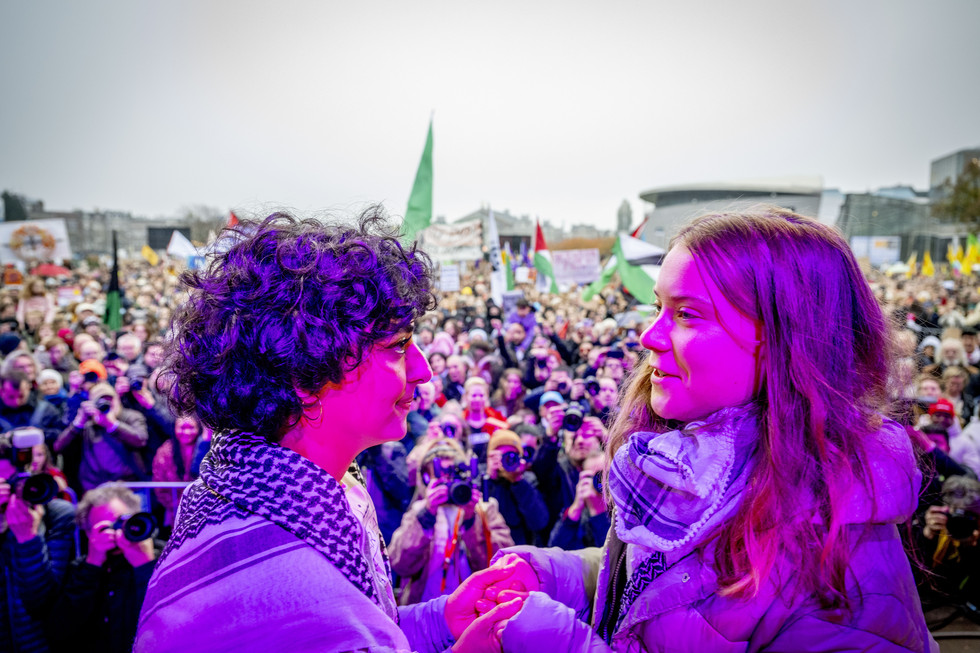▶ listen to this post
Why do climate activists stand with Palestine?
‘No climate justice on occupied land!’ It was Greta Thunberg who chanted this, together with hundreds of climate activists in a large gathering in Amsterdam on 12 November 2023. Around 80,000 people had gathered between the Museums of Modern Art and Van Gogh to listen to Thunberg’s speech. She used most of her time on stage to express support for the Palestinian people, even handing the microphone to Sara Rachdan, a Palestinian activist, to let her talk about the atrocities committed by Israel: the olive trees burnt, the houses destroyed. That Palestine took centre stage during one of the biggest Dutch climate marches ever is a fact that continues to bother many.
To my mind, it is no more than natural that the climate movement stands with Palestine. The project and ambitions of Israel, as it is currently configured, form an obstacle to a climate neutral and climate just global community. Many climate activists already know this. But around me I see they are predominantly trying to find ways of protesting the destruction and violence in Gaza without criticising the project of Israel as such. And this seems to me potentially disingenuous and a disservice to the cause.

Protesting genocide is almost always appropriate
First of all, a genocide is being committed in Palestine. The recent ruling of the International Court of Justice must serve as a wake-up call. As former diplomat Craig Murray writes: “When you take the detail of what the Court has found to be the actual facts of the case, in death and destruction and in intent, I have no doubt that this is a court which is currently minded to find Israel guilty of genocide”.
When genocide is taking place, we should use any occasion to raise our voice and demand an end to it. You and I are morally required to do so. No one needs an excuse for protesting against genocide.
But many climate activists demand a free Palestine in name of ecological protection, and in name of climate justice. And it is this link that large numbers of people still fail to see. What has the violent occupation of Palestine got to do with the climate crisis?
Carbon neutral bombs
At least in recent months, climate activists have largely fallen short of explicating why as climate activists they stand with the Palestinian people. Many remain stuck pointing out various symptoms of the problem. This easily comes across as insincere.
For example, activists keep emphasising that bombs are bad for the environment. The emissions of carbon dioxide that come with Israel’s current bombing campaign in densely populated civilian areas are sky-high. True enough, but it seems to get the priorities wrong—as if the problem would be solved with ‘carbon neutral’ missiles. It gives the impression that climate activists here are just spinning a story that allows them to use the climate movement for an independent pro-Palestinian cause.
Another reason I’ve seen offered is that Palestinians, because of Israeli interference with their existence and lives, cannot adequately transition to sustainable agriculture and energy use, and cannot adequately prepare for the developing climate disaster. I believe this gets closer to what is really the problem, but it still seems to stay at the level of symptom, instead of identifying the malady.
Here’s what I think is going on. In many Western countries, criticism of the state of Israel—of its ethno-nationalism, or of its colonial foundation—is deemed unacceptable. The seeming untouchability of Israel has been a product of zionist propaganda, which not infrequently spreads even through Western government channels and major news media. At the heart of this propaganda is the false assertion that criticism of Israel equates to criticism of Judaism; that questioning the legitimacy of an Israeli presence on Palestinian land is somehow beyond the pale. Indeed, right after the International Court of Justice published its ruling Israeli officials accused even the International Court of anti-semitism.
Caught up in this irrational nightmare of false propaganda, many climate activists are frantically looking for politically neutral ways of convincing those sympathetic to the climate struggle, that fighting the injustice in Palestine is part of that struggle. It seems a safer strategy perhaps; one that only has to take into account the ‘climate impact’ of what is happening and can stay away from politics. But I think this is not honest about the problem the Palestinian people are faced with. And it is also not honest about what the climate movement is trying to achieve.
Eventually the bubble has to be popped. People need to be steered towards an uncomfortable political awakening: that the project of Israel itself, at least as it is currently configured, forms an obstacle to a climate neutral and climate just world. Climate justice demands of activists that they are frank about this.
Persistent Western imperialism
So, the uncomfortable discussion. What is the project of Israel, and why does it matter for the climate movement?
The state of Israel exists by virtue of zionism—a pernicious nationalism based on ethnicity, which integrates racism into politics. There is no place for racist nationalism in a climate just world. Nationalism always seeks to protect against hardship, chaos, and disaster one group of people, leaving another group to deal with a disproportionately larger problem as a result. This is an injustice, and it has burdened the Palestinians ever since zionist settlers arrived on their lands in the late nineteenth century.
Geopolitically, Israel’s role still is to keep in its saddle a system of global capitalism and imperialism that is largely responsible for climate breakdown. Yes, this is an economic story. A story about white power and cash. The state of Israel was erected by Western forces—Britain and the US, predominantly—to protect Western interests in West-Asia, in particular to secure access to shipping routes through the Suez canal in Egypt (a fact obvious to commentators already in the 1920s), and to secure long-term access to fossil resources.
Shrouded in a zionist myth about Biblical origins and destiny, the state of Israel continues to be one of the most important and persistent vectors of Western imperialism. And it does so through colonial oppression and land grab, in the way that colonial oppression and occupation have served European and North-American interests for centuries.
The occupation as a colonial project
We must continue to emphasise Israel’s imperialist and colonial origins, because they form the root of the problem. Basav Sen, a Climate Policy Project director for the Institute for Policy Studies in Washington DC, says that “the Israeli occupation that we’re seeing today, is a manifestation of the same process of colonialism that has also brought us the climate crisis.” The occupation of Palestinian land is a colonial project.
This makes the project of Israel a completely natural target for the climate movement. For two reasons.
First of all, because colonialism is an obstacle to climate justice. Colonisers oppress indigenous populations, and typically dehumanise them, treating them as natural resources to exploit or a nuisance to get rid of. This process was clear in the international system of slavery and settler-colonialism in the early-modern period. It is clear today in the way the Palestinian people are treated by the occupying forces and colonial settlers. On top of that, being the perpetual underdog, the indigenous populations of colonised areas are typically not offered a chance to prepare for the developing climate disaster. And the people of Palestine are no exception.
Second, colonialism is a process that damages the planet, and plainly so. It is premised on a ’take it all and don’t look back’ principle: you extract and exhaust for your own benefit, leaving a depleted and scorched earth for others to worry about. Colonialism has spread across the globe like a pest, depleting and ravaging continents only to prop up the wealth and power of a selected group of mostly white people.
This is history, but a history that hasn’t been put to rest. There is no place for the colonial process to continue in a climate neutral, climate just world. If as a climate activist you are opposed to colonialism—as you’d better be—you should oppose the zionist occupation of Palestine as such. The colonial process needs to stop.

Climate change is not apolitical
People continue to find it incongruous to see anti-colonialism, anti-nationalism and anti-imperialism flourish within the climate movement. ‘What does these have to do with the climate?’, they ask.
For a large part their confusion is due to the concept of ‘climate’ itself. It is an unfortunate abstraction, one that conjures associations with weather patterns, average temperatures, sea levels, and air pollution; natural phenomena, not cultural ones. The ‘climate’ is, almost by definition, an apolitical concept. But the climate crisis is of course political and economic through and through.
The climate movement has during the last decades made great progress in educating its sympathisers. The fight to protect human life in a rapidly deteriorating global ecosystem doesn’t stop at the ‘climate’ narrowly understood. More and more people begin to see that the main obstacles humanity is faced with are political and economic structures, structures responsible for the destruction of ecosystems as well as the cause of wars, of famines, and of racist oppression.
This is why climate justice is becoming so central to the climate movement. Extinction Rebellion Netherlands has even adopted ‘Climate Justice for All’ as its bedrock demand. ‘Demand Zero’, they call it. It shows an awareness that the climate movement needs to aim first and foremost at bringing about political and economic revolution.
But the mere plea for ‘climate justice’ can easily become an element in a rhetoric cut loose from reality. In the end who doesn’t want justice? Who would disagree with the ideal of a just world?
This is why it is important that activists make an effort, stick their necks out, and be very explicit about the justice they are seeking. This will cause friction, but it is the right thing to do. Identify honestly and openly the wrongs that need to be set right. That is why the climate movement now needs to demand the liberation of Palestine from Israeli occupation, from the polluted river to the rising sea.